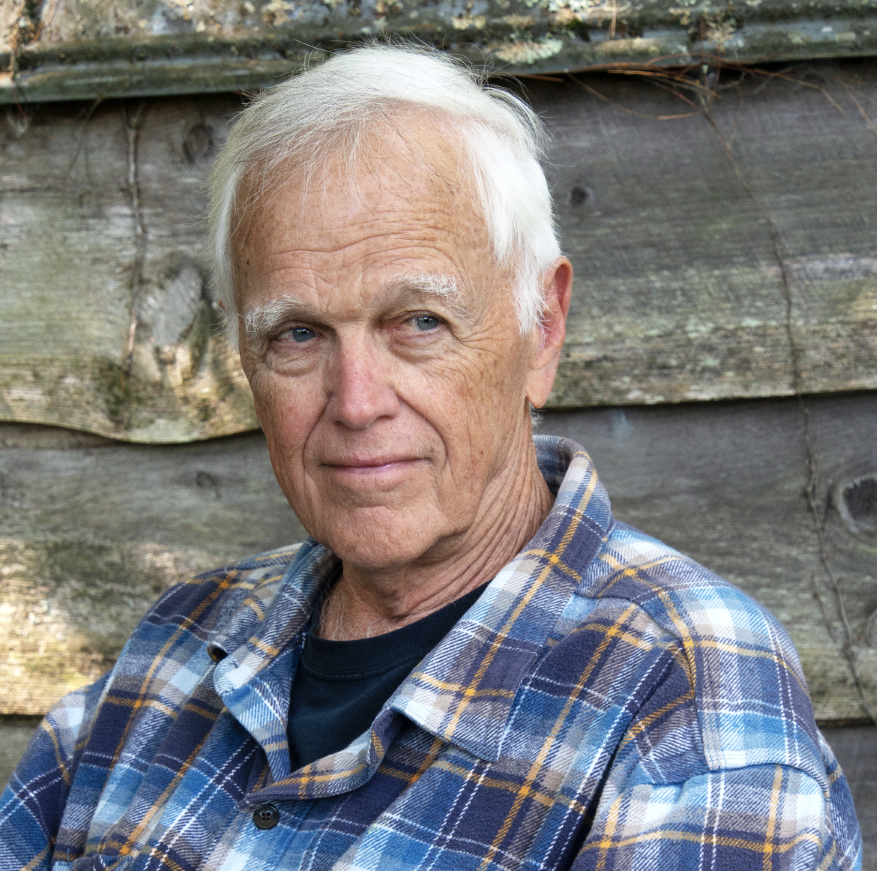by George Hovis, Editorial Board

Readers of Thomas Wolfe are the first to celebrate opportunities to “go home again,” and this spring we are delighted to welcome home to Durham, NC, New York Times bestselling author Clyde Edgerton.
On May 31st and June 1st, 2024, the Thomas Wolfe Society will convene at the Durham Arts Council for its 45th annual conference and will be hosting “An Evening with Clyde Edgerton,” which is free and open to the public. Edgerton’s event begins at 7:30 pm, Friday, May 31st, followed by a book signing. Seating is limited, so please register at: https://forms.gle/GCLSVu3WwWamzQNN7
Registration for the full TWS conference is also available at www.thomaswolfe.org. Although Thomas Wolfe is best known for his mammoth novels, this year’s conference features a full slate of presentations on the short stories of Wolfe.
Like Wolfe’s, Edgerton’s novels tell with humor and compassion of families struggling to overcome their limitations and hold firm to the ties that bind them together. Over the past four decades, Edgerton has been at the vanguard of a North Carolina literary renaissance, publishing twelve books, five of them New York Times Notable Books, bringing to international attention a tradition Wolfe helped launch decades earlier. In addition to seeing his writing be adapted to film and stage, Edgerton has also been celebrated as a musician and a painter.
It has been my great privilege to get to know Clyde and his work for more than thirty years. By the time I arrived in Chapel Hill for graduate study in 1992, I was already a huge fan of his novels. But for some reason, I labored then under the belief that I needed to select as a subject for my master’s thesis literature that was older and from farther afield. I first considered Samuel Taylor Coleridge’s Rime of the Ancient Mariner but was instructed by a prospective advisor that I would need to spend a minimum of two years researching nearly two hundred years of critical literature on the poem before I presumed to add my voice to the mix. A friend of mine was working on his thesis with this same professor, writing about the theme of ennui in the poetry of T.S. Eliot. When I asked my friend, “What’s ennui?” I learned that it was French for boredom. I got to thinking again about some of those new North Carolina writers and especially Clyde Edgerton’s novel Raney and how much fun it would be to read Raney through the lens of Lacanian psychoanalysis or to perform a Derridean deconstruction of the work’s system of binaries. I wasn’t sure what any of that meant, but it sounded impressive.
Well, one of my professors – it might have been Fred Hobson or Joe Flora or Jack Raper – suggested that Clyde had an office over in Durham. Maybe he’d be willing to grant an interview. After a simple phone call, I was instructed to report to a place called Dusty’s Air Taxi. It was located on 9th Street, just down from the Regulator Bookstore, in the basement of the old Couch building, below an Orvis fishing outfitter. When I arrived, I found at the end of a long hallway of windowless doors another windowless door, made of what looked to be very solid wood. Taped to this door was a tiny slip of paper bearing the hand-drawn image of a small, antiquated aircraft.
I suspected that perhaps I was being made the butt of some Kafkaesque joke, but here I was, so I tapped on the door and was instructed by a voice brimming with barely suppressed laughter to “come on in.” On the days that I do believe in a heaven, I like to imagine myself being instructed to enter the pearly gates by a voice not unlike the one I heard that day in the basement of the Couch building. In such a case, I’d know that on the other side I would be treated to better jokes than I’d ever heard and stories so full of human life that even dark time can’t snuff them out.
Inside the “Air Taxi,” I found “Dusty” reclining on a sofa, surrounded by stacks of manuscript and books and fan mail. On the other end of the office sat a small desk, also stacked with the same accumulation of literary life. Pushed against the desk stood two tall, gray, metal filing cabinets. There were no windows and minimal artwork on the walls. You felt that you were in a basement, maybe the perfect place for an author on fire to take deep dives into his memory and imagination.

I pulled a tape recorder out of my bag, and Clyde agreed to let me capture his voice. For the next two hours, he shared captivating family stories that I recognized, in slightly altered forms, from his novels. When I asked about The Floatplane Notebooks, he told of his years as a combat reconnaissance pilot during the war in Vietnam, as well as more recent flights in the vintage Piper Super Cruiser he had flown for fun as Dusty’s Air Taxi service. Among these latter tales was an account of the time that fellow writer Tim McLaurin asked Clyde if he might fly him down to Wilmington to pick up a couple of rattlesnakes. Clyde managed to avoid making that trip but would nevertheless find a place for it in his novel In Memory of Junior.
After this first and subsequent interviews, I came to have a better understanding of how these stories, both lived and inherited, were at the heart of Clyde’s fiction. I also sensed how this was the very same voice, full of warmth and subtle wisdom and generous humor, that I had met on the page. Like anyone who has ever been lucky enough to hear Clyde Edgerton read or speak or sing in person, I knew then that I would carry this singular voice inside of me and it would be available whenever I picked up one of his books.
As it turned out, Clyde was searching for an administrative assistant to file all the mail and manuscript that was beginning to clutter Dusty’s Air Taxi. Once a week, I would take a break from my graduate studies in Chapel Hill and drive to Durham to spend two hours in Clyde’s office “creating order.” Unfortunately for Clyde, I could not stop myself from reading his fan mail and the various drafts of manuscript old and new I found piled on his desk. I even made time to read drafts he had already filed neatly away in those two metal cabinets it was my job to fill. Every week, at the end of two hours, I would look up from my reading and realize that very little paper had migrated from his overflowing inbox to those gray drawers.
Ever since the two years I spent “working” at Dusty’s Air Taxi, I have come to appreciate all the more the labor of librarians, especially those at UNC’s Wilson Library and its Southern Historical Collection, who have acquired many cardboard boxes of Clyde’s papers and systematically ordered them to create an invaluable archive available to scholars and devoted readers alike.
Clyde never once mentioned the filing I just couldn’t seem to accomplish, but when the day came that I finally tendered my resignation, I could read the relief he only half attempted to hide. Sometimes I try to calculate the wages I did not earn, plus the compounded interest. I am reminded then that gifts like the ones Clyde Edgerton has shared with his innumerable friends, students, and readers can never be repaid. They can only be gratefully received.
To Register for Clyde Edgerton’s event at the Durham Arts Council, May 31st, visit: https://forms.gle/GCLSVu3WwWamzQNN7
George Hovis has served on the NCLR Editorial Board for many years. He has contributed ten interviews and articles, including an in-depth interview with Edgerton in 2016. He is a Distinguished Teaching Professor in the Department of English at SUNY Oneonta. He originally hails from outside Charlotte, NC.